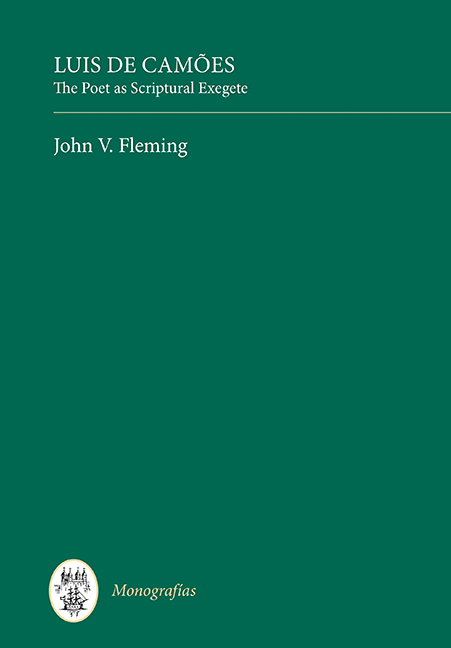6 - Numbers
Published online by Cambridge University Press: 15 September 2017
Summary
A very important structural element of Sôbolos rios, long recognized by the scholars who have analyzed it, is its geometrical and numerological organization. Numerology is not on the whole a science congenial to the contemporary taste. It is also something of a rabbit-hole, down which an incautious scholar can too easily disappear. On the other hand, Camões obviously invested a great deal of energy and ingenuity in perfecting his poem's internal harmonies, which resonate with many of its themes, such as music, proportion, and (as in the Conversión of Juan Boscán), an erring narrator's restitution of moral equilibrium. One simply cannot ignore a major aspect of the poem that its maker obviously regarded as of great significance. This is particular true in that the numerical theme in the poem is closely related to the exegetical instinct.
“I lisped in numbers,” wrote Alexander Pope in the eighteenth century, “for the numbers came.” The idea that certain poets were born to poetry, that poetry was in their blood and made its appearance uninvited in their precocious childish scribblings, was by the age of neoclassicism already a “topos” or recurrent literary theme. Most obviously, Pope was offering a creative imitation of a well-known “autobiographical” poem of Ovid (Tristia iv, 10), in which the Roman poet wrote: “I endeavored to write words disengaged from poetic measures. Spontaneously, my lines ran according to befitting numbers, and whatever I tried to express, the same was poetry.” That the fourth book of the Tristia, and this poem within it, have left upon Sôbolos rios a clear impress in its lines concerning recreational poetry will be obvious to anyone familiar with the two poems.
Certain associations that for us may require a focused lexical review were nearly instinctual for Renaissance poets. For the moment it is enough that Ovid reminds us that among our most ancient words for poetry is numbers. For lyric poetry is song—words artificially organized to the accompaniment of a lyre, a stringed instrument cognate with the psaltery. Another word for a poetic composition intended for stringed accompaniment is psalm. In Camões's poem, which derives from the psalm, poetry and music are coterminous.
- Type
- Chapter
- Information
- Luis de CamõesThe Poet as Scriptural Exegete, pp. 131 - 154Publisher: Boydell & BrewerPrint publication year: 2017



